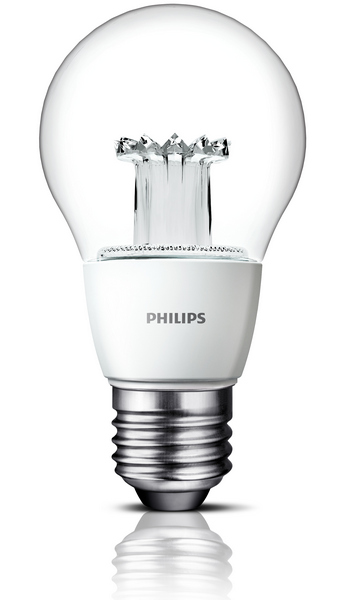Prime Minister Narendra Modi’s ‘Make in India’ initiative, to promote local manufacturing of
LED bulbs fell flat when suppliers could not keep up with the large volume of demands, reported
The Quint.
Lighting giant Philips Lighting for instance received a letter of award from the power ministry to import LED bulbs from China to make up for a supply shortage in Indian manufactured bulbs.
Several other Indian companies and international companies operating in India also received the purchase order.
 |
|
Philips Lighting is turning to Chinese imports to keep up with high demands in India. Pictured here is a Philips Clear 40W Replacement LED bulb. (Photo courtesy of Philips Lighting) |
The ‘Make in India’ set to urge domestic-funded tenders for indigenous companies, including Bajaj, Havells, Syska, Wipro, Eveready and others out of the 25 Indian LED bulb makers.
Philips only supplied about 11% of the total order of 20 million LED bulbs under India’s Ujala lighting plan even when the scheduled delivery date had passed.
As the leading bulb supplier, under the contract Philips was supposed to ship the first tranche of the supply of 40% of the order within 60 days that ended on Nov. 7, 2016. To total supply is to be delivered within 150 days from Sept. 8, 2016 of the Letter of Award (LoA) (for “design, manufacture and supply of self-ballasted 9W LED bulbs) that the Energy Efficiency Services Ltd (EESL) granted to Philips.
Under the terms of the contract, the total order is worth about INR 2 billion, including sales tax, VAT, octroi and entry tax. The LOA stated that 100% payments need to be made within 30 days of the receipt of the supplier’s invoice at EESL office with receipt acknowledgement.
Despite failing to meet the delivery deadline, Philips Lighting did not transfer the deficit quantity of bulbs to other successful bidders, and no additional charges were placed from the multinational company.
Documents collected by The Quint, including from LoA to Philips, showed that EESL, the joint venture of PSUs under the power ministry, instructed Philips India that it could only use Chinese LED manufacturer Hongli Opto Electronics LED chips or Taiwanese Everlite LED chips for 9W LED bulbs.
Reliance on Chinese LED bulbs during a time of demand is to safeguard indigenous businesses and the economy from China’s irrational pricing, said the government and industry.
Chinese electrical equipment import shares in India increased substantially over the last few years and reached 38.87% from 2013-14, more than double from 15.26% in 2005-06.
The report noted several loopholes in Philips Lighting deal in India, where EESL failed to take action when the Dutch lighting company did not comply with requirements of the tender and LoA, whose violation “constitute sufficient ground for annulment of the award and forfeiture of the contract performance guarantee”.
Since the LED bulbs are made in China, the LoA condition that the ““supplier shall ensure interchangeability or product supplied for replacement during warranty (3 years) and maintenance period and even when it is purchased from open market”, cannot be fulfilled.
Justifying the Import of Bulbs
When contacted over the phone, EESL Manager (T & C) Saurabh Kumar said:
“Our tender didn’t prohibit from importing. The LED chip that comes with the bulb is not manufactured in India and I have no knowledge of how Philips could come up with a costing of INR 38 per bulb. The Chinese and Taiwanese companies may be Philips’ partners. Syska, which also manufactures LED bulbs but never participated in a single bid, claimed that it won’t be able to match Philips’ price. So, we were left with no option but to select Philips, which wanted to ramp up its own plans.”
Philips India did not respond to inquiries, while a power ministry public information officer Sanjay Kumar declined to comment.












